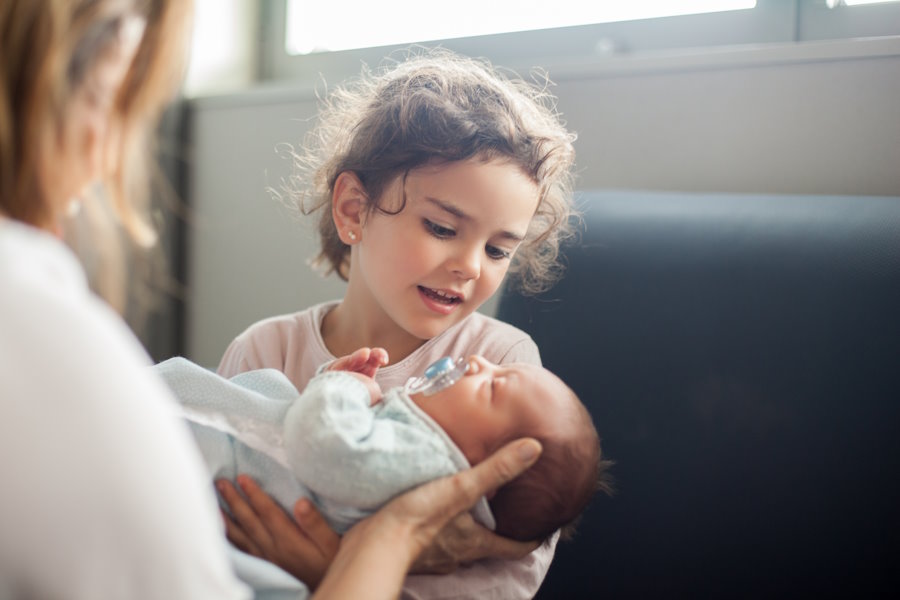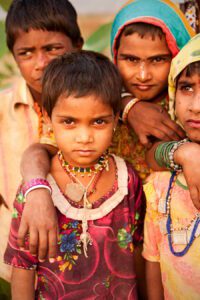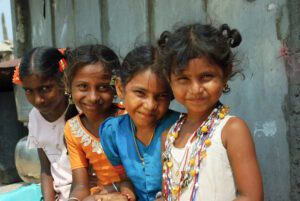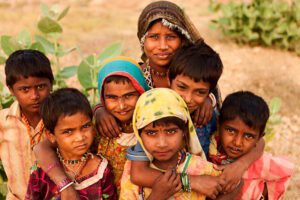Pakistan
Adopting from Pakistan
Children Eligible for Adoption
The country of Pakistan places infants and children who are relatively healthy or have special medical needs. Muslim children from newborn to age 16 are eligible for Guardianship although it is more difficult and rare to be referred a child that is older than 12 months of age in the Pakistan program. Children can be relatively healthy or may have known special medical and/or developmental diagnoses. Most children Hopscotch places reside in Karachi and lack a social history due to the nature and circumstances of how they come into care. It should be expected that referred infants may have been born pre-term and present with a low birth weight, due to the lack of or inaccessibility to prenatal care or environmental toxins and improper nutrition. Abandoned children may be the result of an out of marriage birth, an unplanned birth, conceived of prostitution or rape, or many other scenarios present in Pakistan where women’s and girls’ rights, legal protections and equality are still evolving.

 Pakistan’s Guardianship process is unique in that you will not know of nor be provided information about a child in advance of your arrival to Pakistan unless you are pursuing a valid kinship placement. You should assume the majority of children in care have been abandoned by their living parent(s) rather than orphaned due to the death of one or both parents. Typically, you may be provided a police report upon referral which explains how the child came into care, via abandonment or relinquishment by the biological parent, the location and recorded date of this event, and an estimated age at the time of abandonment, though due to an inability to obtain any additional information, the referral very often is made without any further details.
Pakistan’s Guardianship process is unique in that you will not know of nor be provided information about a child in advance of your arrival to Pakistan unless you are pursuing a valid kinship placement. You should assume the majority of children in care have been abandoned by their living parent(s) rather than orphaned due to the death of one or both parents. Typically, you may be provided a police report upon referral which explains how the child came into care, via abandonment or relinquishment by the biological parent, the location and recorded date of this event, and an estimated age at the time of abandonment, though due to an inability to obtain any additional information, the referral very often is made without any further details.
Because Karachi is a melting-pot of diverse ethnicities, a child referred to you may be of any ethnicity or a combination of the following ethnicities including Punjabis, Pashtuns, Sindhis, Saraikis, Muhajirs, Baloch, Paharis, Hindkowans, Rajputs, Mirpuri and other smaller groups. Smaller ethnic groups found throughout the nation include Kashmiris, Kalash, Chitrali, Sidd, Burkusho, Wakhis, Khowar, Hazara, Shina, Baltis and Jatts.
Families will want to know the most common health risks in Pakistan include but are not limited to Ischemic Heart Disease, Cancer, Lower-Respiratory, Infections, Stroke, Diarrheal Diseases, Neonatal Encephalopathy, Chronic Obstructive Pulmonary Disease, TB, Pre-Term Birth Complications, and Diabetes.
Eligible Applicants
 Practicing Muslim families are eligible to adopt from Pakistan. Pakistani descent or citizenship are not required although having NICOP identification will make the in-country process a bit faster. NICOP can be obtained from the National Vital Records Database (NADRA). Interfaith families with one Muslim spouse can be considered case by case and may be asked to assure the court that the child will be raised in the Muslim faith.
Practicing Muslim families are eligible to adopt from Pakistan. Pakistani descent or citizenship are not required although having NICOP identification will make the in-country process a bit faster. NICOP can be obtained from the National Vital Records Database (NADRA). Interfaith families with one Muslim spouse can be considered case by case and may be asked to assure the court that the child will be raised in the Muslim faith.
The ideal applicants for this program include:
- Dual citizens of the US and Pakistan
- US Americans of Muslim faith living abroad in Pakistan
- US Americans of Muslim faith that have adopted from Pakistan previously
We will happily consider all other applicants on a case by case basis. Please contact info@hopscotchadoptions.org for details.
Under the Guardian and Wards Act of 1890, the religion of the child and family is considered a significant matter of importance in determining the best interests of a child. Pakistan will only place a child with guardians with a shared faith. Ninety-six percent of Pakistan’s citizens are Muslim. Abandoned children are assumed to be Muslim and are referred only to Muslim prospective adoptive families.
 If a child’s identity is known, via relinquishment of parental rights of the biological family, Sharia law requires a child’s identity and lineage to be preserved. It is also expected that the prospective adoptive family must inform the child of their adoption and it is not acceptable for a prospective adoptive family to withhold this fact from the child. It is also expected that no prospective adoptive family will enter into a Guardianship of a child unless they can without hesitation love, protect, educate, and nurture the intended adopted child the same as a biological child. If a prospective adoptive family has any reservations of their ability to love and care for an intended adopted child, it is not recommended that the process continue, regardless of the status of the process.
If a child’s identity is known, via relinquishment of parental rights of the biological family, Sharia law requires a child’s identity and lineage to be preserved. It is also expected that the prospective adoptive family must inform the child of their adoption and it is not acceptable for a prospective adoptive family to withhold this fact from the child. It is also expected that no prospective adoptive family will enter into a Guardianship of a child unless they can without hesitation love, protect, educate, and nurture the intended adopted child the same as a biological child. If a prospective adoptive family has any reservations of their ability to love and care for an intended adopted child, it is not recommended that the process continue, regardless of the status of the process.
While there is a preference of placement given to childless families, this is not a requirement. In fact, placements are made with prospective adoptive families that have biological children and wish to grow their family through adoption. Your success as a prospective adoptive family with or without biological children relies on your application, your home study’s factual depiction of your motivations, suitability, and preparedness, the same as all other prospective adoptive families undergo.
Prospective adopting parents must be at least 25 years of age and must be either a single female or a legally married heterosexual couple. Pakistan does not recognize same sex marriages, common law, or domestic partnerships. There is no length of marriage or number of previous divorce requirements.
As a reminder, Hopscotch is very selective regarding which prospective adoptive parents we will work with. We strongly prefer that prospective adoptive parents have extended family in Pakistan and must be willing to spend at least 4 months abroad.
Program & Process
 Important: The following timelines are only estimates, and are subject to change without notice, per the Pakistani courts.
Important: The following timelines are only estimates, and are subject to change without notice, per the Pakistani courts.
Upon receiving the prospective adoptive parent(s)’ application and subsequent acceptance into the program, a family will be asked to return the Hopscotch service agreement and fee agreement with applicable agency service and associated fees. Upon receipt of these in the Hopscotch Office, the prospective adoptive parent(s) will receive a dossier package template, (a list of required documents) via email which also includes an IMKAAN intake questionnaire.
The prospective adoptive parents will assemble the dossier and undergo the required education while simultaneously working on the completion of the home study with a Supervised Provider agency in their state of residence. The Supervised Provider home study agency must be Hague-accredited and pre-approved by Hopscotch since there are many regulations under which Hopscotch may or may not work with a family’s choice of a home study provider. Contact our office to determine which home study providers are suitable in your state of residence.
 Upon completion of the home study draft, it must be sent to Hopscotch’s office via email in a word document format for a Hague Regulation required review and approval prior to the Supervised home study agency’s finalization and notarization. After finalization and notarization, a scan of the home study must be sent to Hopscotch via email and a hard copy of an original, notarized home study along with the home study agency’s license via mail. A Letter of Approval can then be issued to the prospective client to be included with the I-600A package. The prospective adoptive parent will then submit the complete I-600A package to the USCIS’s Texas Lock Box, with the required evidence listed in the instructions, an original notarized and approved home study with the agency license attached, the Letter of Approval from Hopscotch and the applicable USCIS fee.
Upon completion of the home study draft, it must be sent to Hopscotch’s office via email in a word document format for a Hague Regulation required review and approval prior to the Supervised home study agency’s finalization and notarization. After finalization and notarization, a scan of the home study must be sent to Hopscotch via email and a hard copy of an original, notarized home study along with the home study agency’s license via mail. A Letter of Approval can then be issued to the prospective client to be included with the I-600A package. The prospective adoptive parent will then submit the complete I-600A package to the USCIS’s Texas Lock Box, with the required evidence listed in the instructions, an original notarized and approved home study with the agency license attached, the Letter of Approval from Hopscotch and the applicable USCIS fee.
Upon receipt of the prospective adoptive parents’ I-600A approval from USCIS, the family will ship the finalized, complete dossier to Hopscotch and pay any applicable fees due at the time of this submission. Next Hopscotch reviews the dossier and if complete and accurate, will ship the package to our Foreign Supervised Provider in Pakistan.
Hopscotch primarily works with the highly respected IMKAAN child welfare organization, located in Karachi, Pakistan. IMKAAN is dedicated to providing a shelter for abandoned children and provides round-the-clock monitoring and care. All children placed in the care of IMKAAN Ghar also undergo a thorough medical examination with registered practitioners, providing prospective adoptive families a complete and comprehensive health evaluation of the prospective child, after a court has determined the suitable match. IMKAAN strives to provide detailed records and reports on the health needs of each individual child who resides in care within IMKAAN Ghar. These records are maintained for the child’s prospective adoptive families in preparation of ensuring the specific needs of the referred child may be adequately met.
 Our Foreign Supervised Provider partner, Tahera Hasan, Founder and Executive Director of IMKAAN, is an experienced attorney who works closely with the prospective adoptive family and court to ensure due diligence and the legal and ethical process of the child’s eligibility and Guardianship has been followed, in keeping with the Universal Accreditation Act of 2012 and requirements of USCIS as well as Pakistani law.
Our Foreign Supervised Provider partner, Tahera Hasan, Founder and Executive Director of IMKAAN, is an experienced attorney who works closely with the prospective adoptive family and court to ensure due diligence and the legal and ethical process of the child’s eligibility and Guardianship has been followed, in keeping with the Universal Accreditation Act of 2012 and requirements of USCIS as well as Pakistani law.
Once the dossier package arrives to IMKAAN, the dossier will undergo another careful review. If all is in order, the family will be invited to arrive in Pakistan to begin the referral process. Of importance to note, only the court located in the district where the proposed child resides may officially match the prospective adoptive parents.
The prospective adoptive parent is responsible for arranging their own accommodations, local transportation, shopping, sightseeing. The prospective adoptive parents or their extended family will coordinate flights, in-country transportation, lodging, etc. The prospective adoptive parents will be in communication with IMKAAN and Hopscotch upon arrival and a schedule of appointments will be discussed, including dates, times and location as applicable. Prospective adoptive parents must be prompt and prepared with any documentation requested for official appointments. Please note that neither Hopscotch nor our Foreign Supervised Provider can know when an eligible child meeting a family’s approved parameters will be ready for referral and families must continue to present themselves at local child welfare organizations to be ready for a match when a suitable child comes into care.
Prior to the “First Court” hearing if the court finds the match suitable, the prospective adoptive parents are required to take the child for an independent medical evaluation, share all documentation from the visit and from IMKAAN with Hopscotch’s Associate Director of Clinical Services, Sandra Lennerholt, M. Psych., and an International Pediatric Adoption Specialist (IA Specialist) for a complete evaluation. Once the IA Specialist has completed an evaluation and consultation with the prospective adoptive parents, a copy of the report is required to be sent to Hopscotch’s Associate Director of Clinical Services, Sandra Lennerholt, M. Psych.
Upon receipt of the final document from the IA Specialist, a qualified worker will be assigned to the prospective adoptive parents and an appointment will be scheduled via WhatsApp to complete the required Child Specific Referral Counseling. This is a mandatory participation. The Guardianship process in Pakistan will be stopped until this step has been completed and the prospective adoptive parents have provided a Child Specific Referral Counseling Service Verification Survey within one hour of the counseling session’s ending.
IMKAAN’s attorney will then petition the local court in the district with the intended child resides. During this time, necessary documentation will be obtained including the abandonment report or relinquishment of parental rights letter. The presiding court will conduct a “First Hearing” to re-confirm the child’s abandonment report or relinquishment of parental rights letter are in order, review of the dossier and USCIS approval; finally, the court will set a second hearing date for the “Guardianship Petition’s Hearing”. Upon a favorable and successful hearing, the court will issue a Permission Letter for the child to depart Pakistan for the purposes of adoption.
Next, the following documents will be obtained on behalf of prospective adoptive parents; the child’s Pakistani Birth Certificate, also known as Child “B Form”, National Identity Card for Overseas Pakistanis (NICOP)/Computerized National Identity Card (CNIC)from the National Vital Records Database (NADRA) and a Pakistani Passport.
Kinship Adoptions
Families seeking to adopt a Pakistani child biologically related to them will follow the general process as outlined above. Before Hopscotch accepts a kinship case, we evaluate its viability in terms of USDOS regulations, most importantly via the definition of orphan used by the US government. Not every child will be eligible for adoption under the I-600A/600 process, depending on his or her specific circumstances. Hopscotch will ask families to complete this Kinship Adoption Application Supplement. to explain the child’s background and why there’s a need for international adoption. We will also request that families submit official documentation, such as birth and death certificates, educational records, etc. as evidence of the child’s identity and history. Based on the information provided, we will advise prospective families whether or not their proposed kinship case is likely to be approved by USCIS. If Hopscotch does not believe that a case will succeed within the legal and ethical frameworks of US, Pakistani and Hague regulations, we will be unable to assist the inquiring family.
The Visa Process
After obtaining the required documents and your child’s Pakistani passport, you will be required to produce any documents in a foreign language for certified English translations, prior to submitting to the US Embassy in Islamabad, where the child’s visa will be issued. These documents, along with other documents prepared before you depart for Pakistan, will be submitted to the Embassy with the I-600 Petition, also known as the Petition to Classify Orphan as an Immediate Relative, your DS-260 also known as the Electronic Immigrant Visa Application and a copy of your I-864, also known as the Affidavit of Support. Hopscotch will assist you with this process, upon a scanned copy receipt of the Pakistani generated documents.
The US Embassy now requires submission of all documents for adjudication via a courier. Once you arrive to Pakistan, you will notify the US Embassy of your presence and process status and, after reviewing your documents, the embassy will send specific instructions for what to expect between submission of the I-600 package and your child’s visa pick up appointment.
Congratulations! You can now book your flight to return home with your beautiful child!
Post Placement Reporting
You’ll be responsible for the completion of mandatory post placement reporting for a period of time. This is especially important for families entering the country with a child under Guardianship since the child has not been legally adopted and cannot attain the rights and benefits of US Citizenship afforded to you and your biological children (if applicable). Post placement reporting is necessary for finalization in your state of residence and your home study agency can inform you of the process and necessary steps to be eligible for petitioning your county court to finalize the adoption. Once the adoption is finalized, you have a few more required reports to be sent to Hopscotch, though self-generated via a portal link which will be provided to you at the appropriate time. A copy of your child’s final adoption certificate and your child’s Certificate of Citizenship is required to be submitted to Hopscotch to receive a refundable post adoption deposit. The link below provides a copy of Pakistan’s post placement and post adoption reporting schedule. Please click on the link and print a copy for your records.
Department of State’s Case Data Verification Form
The Country
Pakistan, officially the Islamic Republic of Pakistan, is a country in South Asia. It is the world’s fifth-most populous country with a population exceeding 212.2 million. It has the world’s second-largest Muslim population. It is the 33rd-largest country by area, spanning 881,913 square kilometers. Pakistan is a beautiful country. Home to 108 peaks above 7,000 meters, including K2, the south Asian country’s mountain scenery is stunning. From the lively cities like Islamabad and Lahore to the beautiful valleys in the north, Pakistan is a perfect for family travel.
In contrast to the rich beauty of the country, Pakistan happens to be among the poorest nations in the world. The Human Development Index ranks Pakistan 147th out of 188 countries for 2016. According to several reports, there are a number of reasons why Pakistan is poor, even though it is rich in resources and has the potential to grow.
Though guests are warmly welcomed in Pakistani homes, women in the family often stay away from the guest area when men are present. Female travelers can transcend this cultural barrier. Women are considered safe, and welcome to interact with both men and women.
Fees
Contact Hopscotch Adoptions directly to request a fee schedule.
Recommended Reading
For Children
King For A Day by Rukhsana Khan and Christiane Kromer
Listen To The Wind by Greg. Mortenson and Susan L. Roth
Four Feet, Two Sandals by Karen Lynn Williams and Khadra Mohammed
Silly Chicken by Rukhsana Khan and Yunmee Kyong
Teatime Around the World by Denyse Waissbluth and Chelsea O’Byrne
A Girl Called Genghis Khan by Michelle Lord and Shehzil Malik
Malala Yousafzai by Karen Leggett Abouraya and Susan L. Roth
Free As A Bird by Lina Maslo
Malala by Raphaele Frier and Aurelia Fronty
Malala’s Magic Pencil by Malala Yousafzai and Keracoet
For The Right To Learn by Rebecca Langston-George and Janna Bock
Malala, A Brave Girl From Pakistan / Iqbal, A Brave Boy From Pakistan by Jeanette Winter
Rani In Search Of A Rainbow by Shaila Abdullah
Twenty-Two Cents by Paula Yoo and Jamel Akib
General
Pakistan: A Modern History by Ian Talbot
I Am Malala: How One Girl Stood Up for Education and Changed the World by Malala Yousafzai and Patricia McCormick
Alive and Well in Pakistan A Human Journey in a Dangerous Time by Ethan Casey
Pakistan in the Twentieth Century: A Political History by Lawrence Ziring
Pakistan: A Personal History by Imran Khan
A Hard Country by Anatol Lieven
Frontier of Faith: Islam in the Indo-Afghan Borderland by Sana Haroon
Mottled Dawn by Saadat Hasan Manto
The Pakistani Bride by Babsi Sidhwa
The Wandering Falcon by Jamil Ahmed
The Reluctant Fundamentalist by Mohsin Hamid
My Feudal Lord by Tehmina Durrani
The Crow Eaters by Bapsi Sidhwa
A Case of Exploding Mangoes by Mohammed Hanif
Home Boy by HM Naqvi
Among Muslims: Meetings at the Frontiers of Pakistan by Kathleen Jamie*
Where the Indus is Young: A Winter in Baltistan by Dervla Murphy
Three Cups of Tea by Greg Mortenson
Pakistan Traveller by Tim Blight
Lonely Planet Pakistan & the Karakoram Highway by Sarina Singh, Lindsay Brown, and Paul Clammer
Pakistan – Culture Smart! The Essential Guide to Customs & Culture by Safia Haleem
Pakistan Trekking Guide: Himalaya, Karakoram and Hindu Kush by Isobel Shaw and Ben Shaw
The Last Step: The American Ascent of K2 by Rick Ridgeway
Pakistani Newspapers in English
Home – DAWN.COM
Pakistan News in English
Hopscotch’s Pakistan Program Partner